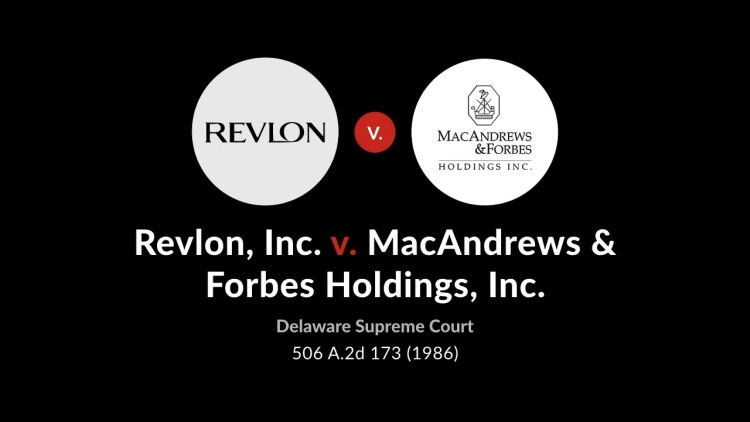Revlon, Inc. v. MacAndrews & Forbes Holdings, Inc.
Delaware Supreme Court
506 A.2d 173 (1986)

- Written by Sean Carroll, JD
Facts
Pantry Pride, Inc. (plaintiff) sought to acquire Revlon, Inc. (defendant) and offered $45 per share. Revlon determined the price to be inadequate and declined the offer. Despite defensive efforts by Revlon, including an offer to exchange up to 10 million shares of Revlon stock for an equivalent number of Senior Subordinated Notes (Notes) of $47.50 principal at 11.75 percent interest, Pantry Pride remained committed to the acquisition of Revlon. Pantry Pride raised its offer to $50 per share and then to $53 per share. Meanwhile, Revlon was in negotiations with Forstmann Little & Co. (Forstmann) (defendant) and agreed to a leveraged buyout by Forstmann, subject to Forstmann obtaining adequate financing. Under the agreement, Revlon stockholders would receive $56 per share and Forstmann would assume Revlon’s debts, including what amounted to a waiver of the Notes covenants. Upon the announcement of that agreement, the market value of the Notes began to drop dramatically, and the Notes holders threatened suit against Revlon. At about the same time, Pantry Pride raised its offer again, this time to $56.25 per share. Upon hearing this, Forstmann raised its offer under the proposed agreement to $57.25 per share, contingent on two pertinent conditions: (1) a lock-up option giving Forstmann the exclusive option to purchase part of Revlon for $100–$175 million below the purported value if another entity acquired 40 percent of Revlon shares and (2) a “no-shop” provision, which constituted a promise by Revlon to deal exclusively with Forstmann. In return, Forstmann agreed to support the par value of the Notes even though their market value had significantly declined. The Revlon board of directors approved the agreement with Forstmann, and Pantry Pride brought suit, challenging the lock-up option and the no-shop provision. The Delaware Court of Chancery found that the Revlon directors had breached their duty of loyalty and enjoined the transfer of any assets, the lock-up option, and the no-shop provision. Revlon and Forstmann appealed.
Rule of Law
Issue
Holding and Reasoning (Moore, J.)
What to do next…
Here's why 907,000 law students have relied on our case briefs:
- Written by law professors and practitioners, not other law students. 47,100 briefs, keyed to 996 casebooks. Top-notch customer support.
- The right amount of information, includes the facts, issues, rule of law, holding and reasoning, and any concurrences and dissents.
- Access in your classes, works on your mobile and tablet. Massive library of related video lessons and high quality multiple-choice questions.
- Easy to use, uniform format for every case brief. Written in plain English, not in legalese. Our briefs summarize and simplify; they don’t just repeat the court’s language.





